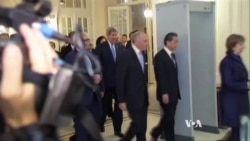The extension of the Iran nuclear talks could give both sides more breathing room as they try to reach consensus on Tehran's uranium enrichment levels, but analysts say the length of the deadline extension could also indicate the two sides remain far apart on core issues.
In a Tuesday briefing, State Department spokesman Jeff Rathke said negotiators from Iran and the five permanent members of the U.N. Security Council plus Germany, or P5+1, were closer to a deal that would make the entire world safer and more secure, and he downplayed the seven-month extension of the talks.
“The extension is just an extension," Rathke said. "It does not provide additional sanctions relief for Iran.”
But Atlantic Council nuclear analyst Matthew Kroenig said the extension could be an indication of deadlock.
“According to my sources, there has really been very little progress made,” he said.
Kroenig said all of the major issues identified a year ago were still major issues, including enrichment levels, sanctions relief and a decision on how long a final deal would remain in place.
“I think there is really no reason to believe that if we continue the same strategy that we will make any progress in the next seven months,” he said.
Brookings Institution analyst Riccardo Alcaro said that he was surprised and disappointed by the seven-month extension, but that the extra time could be beneficial. Continued negotiations by the P5+1, "all things remaining the same, is OK, because the alternative is much worse,” he said.
A final deal remains plausible, Alcaro said, "but in terms of odds, I am more pessimistic than optimistic."
He said Iran’s president and foreign minister might be ready to strike a deal but the country’s supreme leader did not appear to be convinced.





